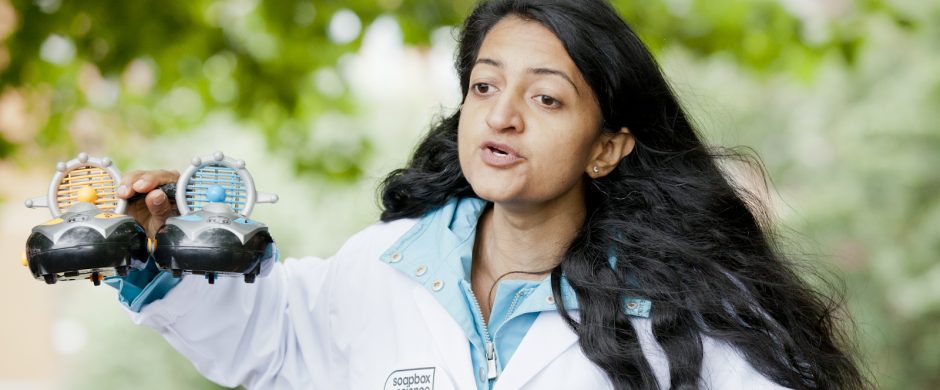 Nicole Pacchiarini is a PhD student at Cardiff University investigating how memory is represented in the brain. Her aim is to link the fields of Psychology and Biology by using established methods from each subject to answer important scientific questions. Come & meet Nicole at Soapbox Science Cardiff , where she is going to speak about “How does the brain remember?”.
Nicole Pacchiarini is a PhD student at Cardiff University investigating how memory is represented in the brain. Her aim is to link the fields of Psychology and Biology by using established methods from each subject to answer important scientific questions. Come & meet Nicole at Soapbox Science Cardiff , where she is going to speak about “How does the brain remember?”.
SS: Nicole, how did you get to your current position?
NP: Being in my first year of my PhD I am the definition of “early career scientist” so my experience is not as extensive as some of the other Professors and Doctors who are speaking. However, my journey to get to my doctorate program is still very fresh in my mind and the courses I undertook are still available to apply for now. My BSc degree was a joint honors course in Psychology and Cognitive Neuroscience at the University of Manchester. This course allowed me to gain knowledge and experience in both fields, as at the time, I did not know which area I preferred. Following this I attended King’s College London and specialised in an MSc in Neuroscience. Here I gained some valuable laboratory experience working in the area of Schizophrenia research. Whilst extremely interesting and exciting, this work made me realize that although it is very important to try and understand disease, we do not yet understand memory in a healthy brain. Consequently, this is the focus of my current work!
SS: What, or who, inspired you to get a career in science?
NP: From a very early age my grandfather was a huge inspiration for me. He was extremely passionate about science and medicine and would often recall his elaborate stories from medical school. In later years he helped me revise, often going into far too much intricate detail than what was needed but his lessons were so captivating we would both get carried away. With very linguistic and creative parents who are not scientific at all, it was his passion that resulted in my pursuing a career in science.
SS: What is the most fascinating aspect of your research/work?
NP: Using cutting edge methods to unravel the answer to a question is very exciting to me. Although I am very early on in my work, it is fascinating trying to tackle challenges and problems and by the end of my doctorate I hope to have contributed new knowledge to this field.
SS: What attracted you to Soapbox Science in the first place?
NP: Firstly, I think it is really important for young scientists to get involved with public engagement. Children and students can really relate to you if you are around the same age. I would love to be a role model and show young people that I was in their shoes only a couple of years ago.
Secondly, Soapbox Science is the perfect opportunity to talk to people who wouldn’t usually be exposed to these kinds of events; I came from a not so great school where events like these never happened and I therefore wanted to be more involved in events which target those children too.
SS: Sum up in one word your expectations for the day – excitement? Fear? Thrill? Anticipation?
NP: Enthusiasm
SS: If you could change one thing about the scientific culture right now, what would it be?
NP: For me it would be the ‘publish or perish’ attitude there is in academia. I think this pressure to quickly and constantly publish academic work is resulting in a lot of poor work being submitted to academic journals. If there was less pressure, scientists may focus more on the quality of their experiments/findings as opposed to the number of papers cited.
SS: What would be your top recommendation to a female PhD student considering pursuing a career in academia?
NP: I am not in a position to give advice on a career in academia however one thing that I will say to anyone considering undertaking a PhD is not to give up after getting rejections. I had a fair few rejections for PhD posts that felt really demoralising at the time. You put a lot of hard work into your applications (which aren’t short) and receiving an automated rejection email with no reason as to why can feel pretty rubbish. I now realise that it is unbelievably competitive and funding is scarce so you can’t take it to heart and MUST NOT GIVE UP!
